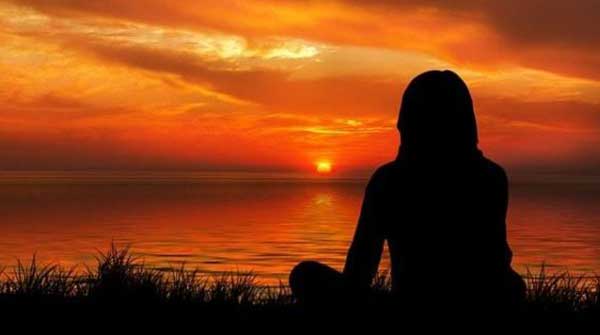Stillness frees the mind, calms the restless soul and illuminates the divine presence in self and others
 Spring may have sprung but most of my yard is still hidden under inches of snow. This year’s Easter egg hunt will have to be indoors.
Spring may have sprung but most of my yard is still hidden under inches of snow. This year’s Easter egg hunt will have to be indoors.
Our yard has been the site of an annual hunt for three generations. One hunt, however, stands out more vividly than the rest.
Our daughter was about four, the only girl and the youngest of the five children hunting for eggs independently. In those days, my in-laws owned the house, and my father-in-law, as he had traditionally done, concocted a riddle to end the hunt. To find the Easter treasure, a sack of golden-covered chocolate coins encased in a golden mesh bag, the children needed to solve the riddle.
We all gathered around to listen to the riddle. The moment my father-in-law finished reading the rhyme, the boys ran off, helter-skelter, seizing on any clue even remotely connected to solving the puzzle.
 |
| Related Stories |
| The overwhelming imagery of the Crucifixion
|
| Who was Pontius Pilate, the man who sentenced Jesus to death?
|
| Hippity hoppity: following the trail of the Easter bunny’s origins
|
Our daughter, however, stood stock still, reciting the rhyme, brow furrowed, thinking. Not even the urging of the adults could make her move. When she was ready and without any help from the hovering adults, she made her way over to the exact spot where the treasure lay hidden. Unfortunately for her, an older cousin saw her. He raced ahead, getting to the treasure seconds before her.
Unbridled enthusiasm and excitement had powered the boys in their search; stillness motivated our daughter. She was willing to sit with the mystery of the puzzle to discover the unknown.
Stillness is something with which many struggle.
Yongey Mingyur Rinpoche, a much-loved and well-respected Buddhist meditation master, remarked that North Americans can’t sit still for five minutes. While he may have spoken more diplomatically than I’ve rendered it, it’s hard to argue with his observation.
In a culture that frequently conflates self-worth and busyness – the busier the individual, the more important and worthy – it can be exceedingly difficult to disengage from the helter-skelter of daily life. The lure of social media compounds the problem. One study found that smartphone users tap, touch, swipe or click their phones, on average, 2,617 times a day. For the heaviest users, that number rises to a whopping 5,427 times a day! Typing thumbs are indicative of the restlessness of the human spirit.
Even when the body is still, the mind fidgets. Richard Rohr, a Franciscan priest and founder of the Center for Action and Contemplation, encourages individuals to notice their thoughts. He points out that the mind is frequently occupied with thoughts of the past or future, rarely resting in the present moment.
Using a quotation from the Hebrew Psalms, he encourages would-be contemplatives to sit with the words, “Be still and know that I am God,” and then let the words fade away until only “be” remains.
In his spiritual autobiography, Saint Augustine wrote, “You have made us for yourself, and we are restless until we rest in you.” Augustine knew of what he spoke. An intelligent, ambitious and restless man, he sampled everything that life in the Roman empire of the fourth century had on offer, including its bread and circuses and the religious philosophies of the time. For Augustine, the pursuit of ambitions, distractions and philosophies were signs of a restless soul separated from and searching for God.
Stillness of mind or body is not the natural human inclination. We are more inclined towards activity. Seeking, but not necessarily finding, we are on the move, like little boys searching for that Easter treasure.
The practice of stillness uncovers that which the hum of activity obscures. Stillness frees the mind, calms the restless soul and illuminates the divine presence in self, others and all created things.
In stillness, we discover a treasure worth seeking.
Louise McEwan has degrees in English and Theology. She has a background in education and faith formation.
For interview requests, click here.
The opinions expressed by our columnists and contributors are theirs alone and do not inherently or expressly reflect the views of our publication.
© Troy Media
Troy Media is an editorial content provider to media outlets and its own hosted community news outlets across Canada.

